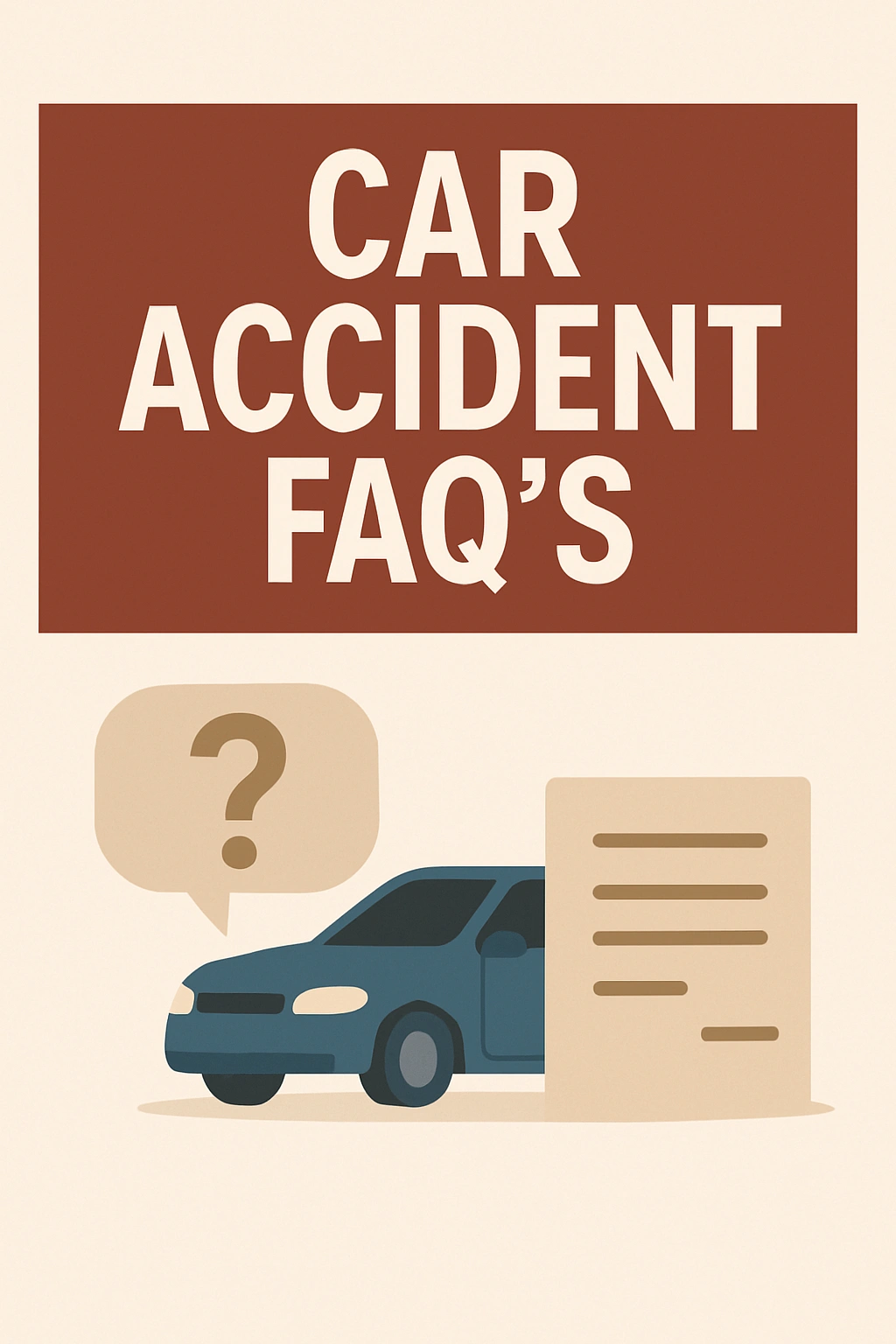Immediately After an Car Accident
Q: What should I do immediately after being involved in a car accident?
A: Your first priority should be safety. Check yourself and others for injuries and call 911 if anyone is hurt. Move to a safe location if possible. Then:
- Exchange information with the other driver(s)
- Document the scene with photos
- Collect contact information from witnesses
- Report the accident to police
- Notify your insurance company
For a detailed guide on the critical first steps to take after an accident, visit our Complete Guide for Auto Accident Victims in Phoenix.
Q: Do I need to call the police for minor accidents?
A: While some minor fender benders might not require police presence, it’s generally advisable to have an official police report. In many states, you’re legally required to report accidents that involve injuries or property damage over a certain amount (typically $1,000-$2,500). When in doubt, call the police.
Q: What information should I exchange with the other driver?
A: Be sure to collect:
- Full name and contact information
- Insurance company and policy number
- Driver’s license number
- License plate number
- Make, model, and year of vehicle
- Location of accident
Q: Should I admit fault at the accident scene?
A: No. Avoid making statements that could be interpreted as admitting fault. Stick to exchanging necessary information and reporting the facts of what happened to police. Fault determination is a complex process that involves insurance companies and potentially the courts.
Medical Concerns
Q: Should I seek medical attention even if I feel fine?
A: Yes. Many injuries, particularly soft tissue injuries like whiplash, may not manifest symptoms immediately. Some injuries can take days or even weeks to become apparent. A medical evaluation creates documentation of your condition and can identify issues before they become more serious.
Q: Who pays for my medical bills after an accident?
A: This depends on your location and insurance coverage:
- In no-fault states, your personal injury protection (PIP) insurance typically covers initial medical expenses
- In fault states, the at-fault driver’s liability insurance should cover your medical expenses
- Your health insurance may cover costs initially, then seek reimbursement
- Medical payments coverage (if you have it) can help cover costs regardless of fault
Q: What if my injuries prevent me from working?
A: You may be entitled to compensation for lost wages. Document all missed work time and obtain a note from your doctor explaining your inability to work. This documentation will be important when filing an insurance claim or lawsuit.
Insurance Issues
Q: Should I notify my insurance company even if the accident wasn’t my fault?
A: Yes. Most insurance policies require you to report any accident, regardless of fault. Failing to notify your insurer could potentially jeopardize your coverage if issues arise later.
Q: Will my insurance rates go up after an accident?
A: Not necessarily. If you weren’t at fault, many insurers won’t raise your rates. However, policies vary by company and state. Some insurers have accident forgiveness programs for first-time incidents or minor accidents.
Q: What if the other driver doesn’t have insurance?
A: If you have uninsured motorist coverage, your own insurance will help cover your damages. Without this coverage, you may need to pursue a lawsuit against the uninsured driver, though collecting damages can be difficult if they lack assets.
Q: Should I accept the insurance company’s first settlement offer?
A: Rarely. Initial settlement offers are typically lower than what your claim may actually be worth. It’s advisable to consult with an attorney before accepting any settlement, especially if you’ve sustained significant injuries or property damage.
Legal Considerations
Q: How long do I have to file a claim after an accident?
A: This varies by state. Most states have a statute of limitations between 1-6 years for car accident claims, with 2 years being common. However, it’s best to start the claims process as soon as possible while evidence is fresh.
For specific information about Arizona’s statute of limitations and legal options, visit our Car Accident Legal Resource Center.
Q: Do I need to hire an attorney after a car accident?
A: Not all accidents require legal representation. However, consider consulting an attorney if:
- There are serious injuries or fatalities
- Fault is disputed
- Multiple parties are involved
- The insurance company is offering a low settlement
- You’re uncomfortable negotiating with insurance adjusters
Q: What damages can I recover after a car accident?
A: Potential damages include:
- Medical expenses (current and future)
- Lost wages and diminished earning capacity
- Property damage
- Pain and suffering
- Emotional distress
- Loss of enjoyment of life
- In some cases, punitive damages
Vehicle Damage
Q: Can I choose my own repair shop?
A: Yes. While insurance companies may recommend specific shops, you generally have the right to choose where your vehicle is repaired. Some states have laws specifically protecting this right.
Q: What if my car is declared a total loss?
A: If repair costs exceed a certain percentage of your vehicle’s value (typically 70-80%), the insurance company will declare it a “total loss.” You’ll receive the actual cash value (ACV) of your vehicle before the accident, minus any deductible.
Q: What if I disagree with the insurance company’s valuation of my vehicle?
A: You can dispute their valuation by:
- Researching comparable vehicles in your area
- Documenting recent improvements or maintenance
- Getting independent appraisals
- Highlighting features that might increase value
- Negotiating directly or involving an attorney
Long-Term Considerations
Q: What if I discover additional injuries or damages after settling my claim?
A: Once you sign a settlement agreement, you typically cannot make additional claims for the same accident. This is why it’s important to ensure all injuries are fully diagnosed and treated before accepting a settlement.
Q: Will the accident appear on my driving record?
A: Accidents that involve police reports, insurance claims, or traffic citations typically appear on your driving record. The length of time they remain visible varies by state, usually between 3-5 years.
Q: Should I keep records after everything is settled?
A: Yes. Keep all documentation related to the accident, including medical records, repair bills, insurance correspondence, and police reports for at least the duration of your state’s statute of limitations period, if not longer.



